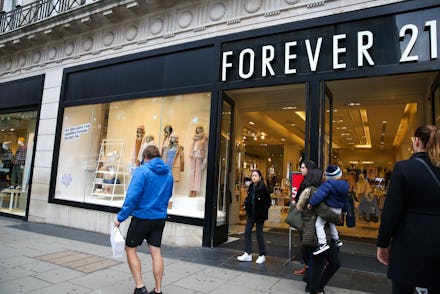The world is burning and there’s a lot we have to do to prevent further destruction; Much of it is at the systemic level (here’s looking at you, U.S. Military), but there are measures that individuals can take too. Cutting down on fast fashion is a big one: cheap and trendy clothing is extremely harmful to the environment and is often created by abusive labor practices. One night in a snakeskin bodycon dress is an overall net negative for the world. And consumers are becoming more and more aware of that.
So much so perhaps, that it’s making a sizeable dent in the profits of fast fashion retailers. Most recently, Forever 21, which has over 800 stores in three continents, is suffering from a reduction in profit. According to Bloomberg, the company is considering filing bankruptcy in order to close its least profitable retail spaces.
But Forever 21 is just the latest large retailer considering bankruptcy. In the last few years, several major stores have thrown up a financial white flag. Barney’s declared bankruptcy earlier in August — the second time the company has done so. The store also filed for bankruptcy in 1996, according to CNBC. Designer Roberto Cavalli filed in April, retailer Charlotte Russe filed in February, and in March 2018, the jewelry retailer Claire’s.
Bloomberg reports that if Forever 21 does file for bankruptcy, mall landlords like Simon Property Group Inc. and Brookfield Property Partners LP will be the ones to hurt. Forever 21 rents nearly 1.5 million square feet in retail space for 99 spaces, just from Simon — a closure of stores could lead to unfillable retail space.
Other major retailers who haven’t declared bankruptcy have also reported slow in sales. H&M and Zara, two of the largest fast-fashion retailers in the world, have also reported a decrease in sales (though they are still making billions) in the last two years, according to the Fashion Law. This could partially be due to increased awareness among Gen Z and Millenial shoppers about the harms of fast fashion. In the London Times, India Knight compared shopping for fast fashion to eating fast food — unhealthy and unenjoyable.
But, the decline retailers like Forever 21 are experiencing might not only be due to the more conspicuous consumer. They might just not be making their fashion fast enough. Fashion Nova, one of the most competitive fast fashion companies is entirely online and is experiencing massive growth. The company was the most searched clothing company of 2018 — and receives the highest engagement of all clothing brands on social media. That makes sense considering that the company advertises with Cardi B, Kylie Jenner, and nearly every other Instagrammer with a major following.
And Fashion Nova is just as guilty of the harmful fast fashion practices as brands like Forever 21, H&M, and Zara — they introduce thousands of new styles every year.
There are a number of factors that could’ve contributed to Forever 21’s financial troubles. It’s nice to be optimistic about consumer motives. Perhaps a concern for the environment is naturally phasing out some of our most wasteful retailers. At least one thing is certain, the way we shop is changing — hopefully for the better.
